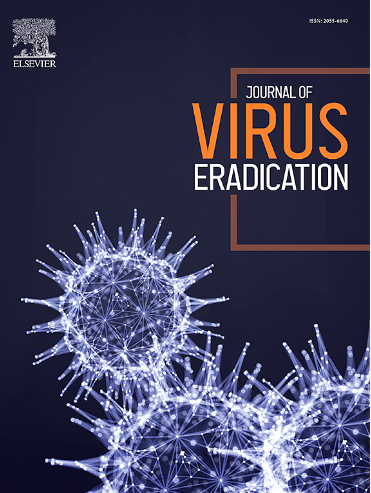Indomethacin inhibits human seasonal coronaviruses at late stages of viral replication in lung cells: Impact on virus-induced COX-2 expression
IF 3.5
4区 医学
Q2 IMMUNOLOGY
引用次数: 0
Abstract
Coronaviruses (CoV), zoonotic viruses periodically emerging worldwide, represent a constant potential threat to humans. To date, seven human coronaviruses (HCoV) have been identified: HCoV-229E, HCoV-NL63, HCoV-OC43 and HCoV-HKU1, globally circulating in the human population (seasonal coronaviruses, sHCoV), and three highly-pathogenic coronaviruses, SARS-CoV, MERS-CoV and SARS-CoV-2. Although sHCoV generally cause only mild respiratory diseases, severe complications may occur in specific populations, highlighting the need for broad-spectrum anti-coronavirus drugs. Herein we show that indomethacin (INDO), a non-steroidal anti-inflammatory drug widely used in the clinic for its potent anti-inflammatory and analgesic properties, effectively inhibits the replication of Alpha-coronavirus HCoV-229E and Beta-coronavirus HCoV-OC43 in human lung-derived cells. Indomethacin does not interfere with HCoV binding or entry into target cells, but acts at late stages of the virus life cycle, inhibiting viral RNA synthesis and infectious viral particles production. Although INDO anti-inflammatory action is mediated by blocking cyclooxygenase-1 and -2 (COX-1/2) enzymatic activity, the antiviral effect appears to be cyclooxygenase-independent and is not mimicked by the potent COX-1/2 inhibitor aspirin. Interestingly we found that both seasonal HCoVs markedly (>100 fold) induce the expression of the pro-inflammatory mediator COX-2 in lung cells; notably, INDO-treatment was found to effectively inhibit virus-induced COX-2 expression at the transcriptional level, revealing an additional mechanism to prevent COX-2-mediated inflammatory reactions in HCoV-infected lung cells, besides COX activity inhibition. Altogether the results indicate that indomethacin, possessing both potent anti-inflammatory properties and a direct antiviral activity against HCoV, could be effective in the treatment of Alpha- and Beta-coronavirus infections.
吲哚美辛能在病毒在肺细胞中复制的晚期阶段抑制人类季节性冠状病毒:对病毒诱导的 COX-2 表达的影响
冠状病毒(CoV)是一种在全球范围内定期出现的人畜共患病毒,对人类构成持续的潜在威胁。迄今为止,已发现七种人类冠状病毒(HCoV):它们是:HCoV-229E、HCoV-NL63、HCoV-OC43 和 HCoV-HKU1(在全球人类中流行的季节性冠状病毒,sHCoV),以及三种高致病性冠状病毒:SARS-CoV、MERS-CoV 和 SARS-CoV-2。虽然 sHCoV 通常只会引起轻微的呼吸道疾病,但在特定人群中可能会出现严重的并发症,这就凸显了对广谱抗冠状病毒药物的需求。在本文中,我们发现吲哚美辛(INDO)是一种非甾体抗炎药物,因其强大的抗炎和镇痛特性而被广泛应用于临床,它能有效抑制α-冠状病毒 HCoV-229E 和β-冠状病毒 HCoV-OC43 在人肺源性细胞中的复制。吲哚美辛不会干扰 HCoV 与靶细胞的结合或进入靶细胞,但会在病毒生命周期的晚期发挥作用,抑制病毒 RNA 的合成和传染性病毒颗粒的产生。虽然 INDO 的抗炎作用是通过阻断环氧化酶-1 和-2(COX-1/2)的酶活性介导的,但其抗病毒作用似乎与环氧化酶无关,并且不会被强效 COX-1/2 抑制剂阿司匹林模拟。有趣的是,我们发现这两种季节性 HCoV 都能显著(100 倍)诱导肺细胞中促炎介质 COX-2 的表达;值得注意的是,INDO 处理能在转录水平上有效抑制病毒诱导的 COX-2 表达,揭示了在 HCoV 感染的肺细胞中,除了抑制 COX 活性之外,还有一种机制可以防止 COX-2 介导的炎症反应。总之,研究结果表明,吲哚美辛具有强效抗炎特性和直接抗病毒活性,可有效治疗甲型和乙型冠状病毒感染。
本文章由计算机程序翻译,如有差异,请以英文原文为准。
求助全文
约1分钟内获得全文
求助全文
来源期刊

Journal of Virus Eradication
Medicine-Public Health, Environmental and Occupational Health
CiteScore
6.10
自引率
1.80%
发文量
28
审稿时长
39 weeks
期刊介绍:
The Journal of Virus Eradication aims to provide a specialist, open-access forum to publish work in the rapidly developing field of virus eradication. The Journal covers all human viruses, in the context of new therapeutic strategies, as well as societal eradication of viral infections with preventive interventions.
The Journal is aimed at the international community involved in the prevention and management of viral infections. It provides an academic forum for the publication of original research into viral reservoirs, viral persistence and virus eradication and ultimately development of cures.
The Journal not only publishes original research, but provides an opportunity for opinions, reviews, case studies and comments on the published literature. It focusses on evidence-based medicine as the major thrust in the successful management of viral infections.The Journal encompasses virological, immunological, epidemiological, modelling, pharmacological, pre-clinical and in vitro, as well as clinical, data including but not limited to drugs, immunotherapy and gene therapy. It is an important source of information on the development of vaccine programs and preventative measures aimed at virus eradication.
 求助内容:
求助内容: 应助结果提醒方式:
应助结果提醒方式:


